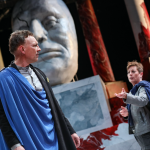Blog
Artistic Disruptions of Antiblack Violence
 Torin Monahan, Professor of Communication
Torin Monahan, Professor of Communication
Torin Monahan, Professor of Communication and IAH Faculty Fellow, writes about themes he has been exploring in his current project on art, race, and surveillance.
Read moreFaculty Fellows Expanding the Field of African American and African Diasporic Studies
 Philip Hollingsworth, IAH Program Administrator
Philip Hollingsworth, IAH Program Administrator
We address four questions currently being tackled by professors at UNC-Chapel Hill, who are also Faculty Fellows at the Institute for the Arts and Humanities. Their investigations also put the African American and African Diasporic experience at their center, greatly expanding the fields of study that their research represents.
Read moreHow to Host Effective Virtual Events
 Ebony Johnson, IAH Event Planner
Ebony Johnson, IAH Event Planner
Since the onset of the novel coronavirus pandemic, industries around the world had to quickly pivot into making experiences and events available to their audiences virtually. While webinars have been available for years now, the shift into online events can create unique challenges. How do you ensure your audiences are engaged, as they would be in person? How can your teams be quickly equipped to manage events virtually, via Zoom or other programs?
Read moreChaos, COVID-19, and Julius Caesar
 Professor Adam Versenyi
Professor Adam Versenyi
Written in 1599 and first performed at London’s Globe Theatre, Julius Caesar reflects the shaky nature of English society in the later years of Queen Elizabeth I’s rule as she increasingly relied upon spies and propaganda to maintain a semblance of stability. The Earl of Essex and Robert Cecil vied for political power. Like the United States now, Shakespeare’s Rome was in a moment of great transition.
Read moreVIEW MORE IMPACT STORIES Previous | Next

